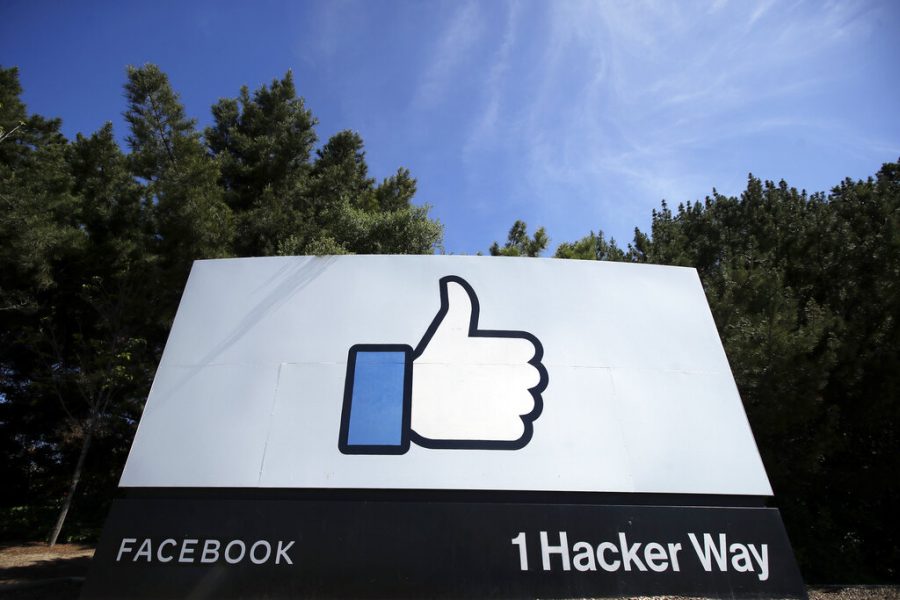Cancel culture and conformity
In this April 14, 2020, file photo, the thumbs up Like logo is shown on a sign at Facebook headquarters in Menlo Park, Calif.
Apr 2, 2021
Cancel culture exists to challenge influence, but its own influence cannot be challenged. Cancel culture destroys the very debate that brought forth its existence. As it stands, the direction of cancel culture is trending toward the elimination of differences, yielding an impersonal equality determined by sameness.
It would not be possible to cancel someone without first giving him the celebrity status that cancelation eliminates. Sympathy for victims of cancel culture is often garnered through arguments regarding the impersonal, end-focused mentality of cancel culture. The mob calling for social justice moves on, but those victims of the process through which it moves do not. These arguments ignore the fundamental nature of cancel culture, which removes a status assigned by admirers in the first place. One’s humanity is replaced with celebrity, and if he’s unfortunate enough, his celebrity is canceled. Destroying the differences between celebrity and normalite does not foster equality or justice.
Though social media seem to disguise exile, the relentless cancelation of celebrities is a reestablishment of historical intolerance. Banishing those who disobey cultural norms is not new, but the platform in which banishment occurs is new. Digital indifference and partial anonymity allow the mob to escape accountability while it demands accountability from celebrities. Cancel culture is the newest development of enforcing normative standards.
The problem of cancel culture is not the vehicle or even the amount of people that the vehicle has flattened; it is the insistence upon enforcing morality. By doing so, our society is gradually eliminating difference and individuality by disguising it as the pursuit of social equality. Whether it is a racist tweet or the profuse spreading of harmful propaganda, the goal of cancel culture is conformity over equality.
Eliminating difference is socialism’s answer to inequality. People are united in their conformity instead of in their individuality. According to psychoanalyst Erich Fromm, “The deepest need of man … is the need to overcome his separateness,” and conformity saves the individual “from the frightening experience of aloneness.” Cancel culture, which is by no means unique to a political party, creates a clear in-group and a target intended to be socially ostracized. The in-group overcomes aloneness by exploiting the vulnerability of the individual state, and the result cannot be equality. Regardless of whether someone deserves to be canceled, modern culture encourages conformity and exile simultaneously. In other words, justice has nothing to do with it.
An implicit pressure to conform is nothing new to modern society. Both cultural customs and the fear of being viewed as the Other contribute to this implicit pressure. By contrast, Orwellian and Huxleyan dystopias illustrate enforceable, explicit pressure to conform. What separates modernity from Orwell’s Oceania is the choice individuals have to conform in the former. Once individuation is no longer an option, society has crossed the threshold into the dystopian. As a reflection of American society, cancel culture demands adherence to its ideals and exiles dissent. Freedom and justice yield to power. This power is capable of being overextended, and many would argue that it has been.
Immanuel Kant argues that the essence of equality is that no one should be the means to another’s end. Cancellation, however, urges mobs to use individuals as a means for their end of perceived social equality. The human being used as a means is discarded for a supposed greater good, and there is a political battle over the right to define the greater good. When persuasion and debate do not work, suppression appears to. Suppression, even the suppression of outdated and harmful ideas, cannot be a means to the end of equality. Conveniently, suppression is necessary for the equality characterized by collectivization and conformity. American equality cannot be bought at the expense of individuality.














Paul • Jul 27, 2023 at 6:47 am
While I agree with everything that you mention I think this statement is confusing:
“Eliminating difference is socialism’s answer to inequality.”
Idk why you are criticising socialism and then using a marxist theorist (Fromm) to back up the claim. While I agree with everything else I don’t think ‘socialism’ is causing cancel culture’s conformity that you mentioned and neither does Fromm. He believed capitalism causes conformity.
Fromm Art of Love, “Just as modern mass production requires the standardization of commodities, so the social process requires standardization of man, and this standardization is called ‘equality’.”
Also cancel culture (I assume) originates from the U.S.A, which isn’t a socialist country as far as I know.
Anyway still an interesing article.